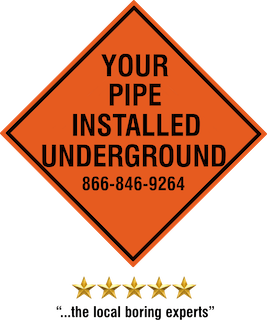Drainage Boring
Underground Boring - Drainage Boring Contractors
Drainage boring is a critical technique in underground utility installation projects where precision and functionality are essential, particularly in applications like stormwater management, sewer systems, and gravity-fed drainage systems. Here’s how drainage boring is accomplished:
Underground Boring - Drainage Boring Companies
1. Horizontal Auger Boring
- Purpose: Horizontal auger boring is a trenchless method used to install underground utilities, including drainage pipes, with precision and minimal surface disruption.
- Application: This method is ideal for crossing obstacles like roads and railroads because it allows for installation while keeping the surface intact.
- Drainage Role: It is used to install gravity-fed drainage or sewer systems that require precise alignment to maintain the desired % fall for efficient water flow.
2. Jack and Bore
- Purpose: Jack and bore involves jacking a casing pipe through the ground while excavating soil with an auger inside the casing.
- Application: Often used for installing stormwater and sewer pipes under infrastructure like highways, municipal streets, or government projects.
- Precision: This method ensures pipes are installed on line and on grade, which is critical for drainage systems relying on gravity to function correctly.
3. Hand Mining
- Purpose: Hand mining is a manual technique used for smaller-scale or highly precise projects, often in challenging geotechnical conditions.
- Application: It’s sometimes used in conjunction with jack and bore when encountering rock or other materials requiring manual excavation.
- Drainage Role: Hand mining allows for corrections or modifications to ensure pipes are laid to the correct fall and alignment.
4. Stormwater, Sewer, and Drainage
- Stormwater Systems: Designed to handle runoff from rain and urban surfaces. Pipes installed using boring methods must be accurately sloped for efficient water flow.
- Sewer Systems: Typically gravity-fed, requiring precise alignment and fall to transport wastewater efficiently.
- Drainage Systems: Often connected to municipal or government infrastructure, where proper engineering and installation methods like boring are essential.
5. On Line, On Grade, % Fall, and Precision
- On Line: Refers to the horizontal alignment of the pipe, ensuring it follows the design plan exactly.
- On Grade: Refers to the vertical slope of the pipe. For gravity-fed systems, maintaining the correct % fall (slope) is crucial to prevent blockages or inefficiency.
- Precision: Advanced boring technologies allow for high accuracy, ensuring compliance with engineering specifications and project requirements.
6. Municipal and Government Projects
- Compliance: These projects often demand adherence to strict environmental and engineering standards.
- Applications: Drainage boring is critical in projects like highway drainage, railroad culverts, and large-scale stormwater management systems.
- Advantages: The trenchless nature of boring minimizes surface disruption, which is a key consideration in urban and municipal settings.
7. Roads and Railroads
- Challenges: Installing drainage systems under roads or railways without disrupting traffic requires trenchless methods like jack and bore or horizontal auger boring.
- Outcome: These methods ensure stormwater and sewer systems are installed efficiently and accurately beneath infrastructure, preserving the integrity of surface systems.
Underground Boring - Drainage Boring Near Me
In summary, drainage boring integrates advanced trenchless technologies with precision techniques to install critical underground utilities in complex environments. Whether for municipal projects or private developments, the ability to maintain line, grade, and fall is essential for creating effective, long-lasting systems.


